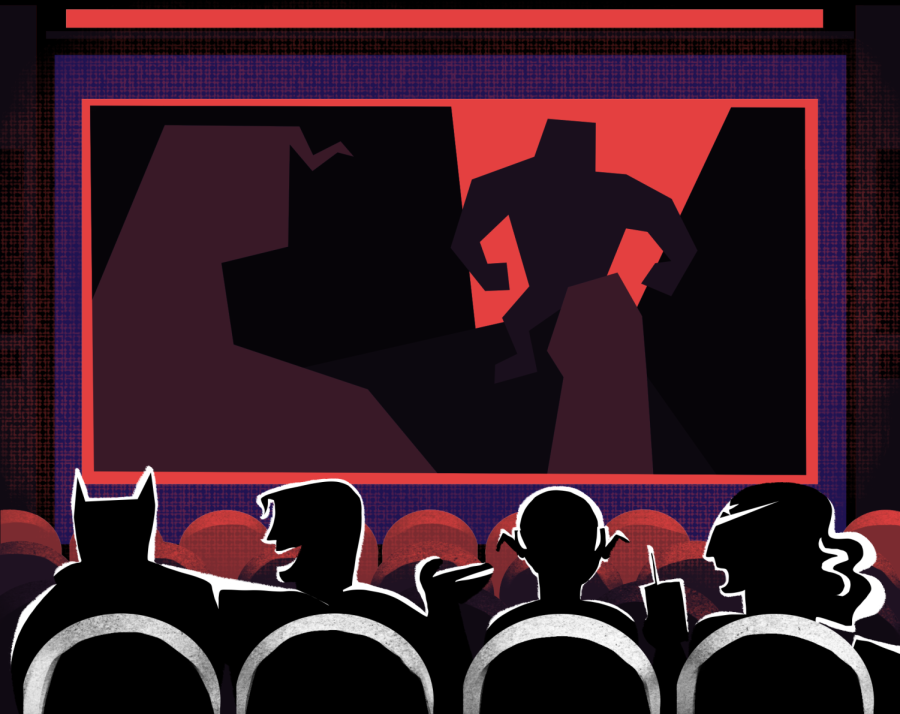[Opinion] Franchise superhero movies may not be cinema, but that’s okay
Superhero movies don’t always have to be cinematic to be great movies.
April 8, 2022
In 2019, when director Martin Scorsese said Marvel movies aren’t cinema and closest resembled theme parks, worldwide uproar and debate were caused, with Marvel fans, actors and filmmakers alike refuting his statement. However, these movies and others like them can not be considered cinema, but that is not an insult to say considering they still flourish in their own medium.
You can call just about anything “cinema,” but I think for something to fully embody true cinema, it is best to take a look at the classics: “The Godfather.” “Citizen Kane.” “Casablanca,” “The Shining” and “The Shawshank Redemption.” What do any of these have much in common with “Iron Man 2” or “Justice League”? Essentially nothing.
Superhero movies often place an emphasis on things like special effects, fan service, easter eggs and “cheer moments” over aspects like writing, themes and acting performances. These movies also rely on audience hype and theories to promote themselves, which can often overshadow the movie itself if, for example, a beloved character has a cameo or a long-teased villain finally makes an appearance. Moreover, since essentially all superhero movies now exist in their own shared universes, they cannot stand on their own; rather, each one is a piece in a never-ending puzzle, built up by previous entries and building up to future ones.
All this to say, just because superhero movies employ these strategies does not automatically drag down their intrinsic value, although many cinephiles or “traditionalists” argue that. Audiences are allowed to be entertained by payoffs from the last movie or constant one-liners; things like these may not be unique or high-quality, but fans should not be shunned for indulging in them. An open mind is necessary to evaluate these movies, because while “Doctor Strange” will never be as cherished as “Taxi Driver,” they each provide a different variety of entertainment.
Hope for the future may be lost and there are certainly negatives to be found in the “Marvelification” of modern superhero movies and blockbusters in general, but every now and then something comes out that goes against the grain. Sam Raimi’s Spider-Man trilogy, particularly “Spider-Man 2,” is often praised for its themes and cinematic quality, and it doesn’t tie in to anything outside of itself (excluding “Spider-Man: No Way Home”). “Logan” may connect to the X-Men series, but many distinguish it for Hugh Jackman’s performance and its grittiness.
More recent examples would be “Joker” and “The Batman,” which each establish themselves outside of any shared universes, instead resembling more typical “cinematic” films and simply using their characters as blueprints for something bigger than a standard franchise entry. The best comic book movies represent the best of both worlds.
It’s okay for superhero movies to exist as they do today, and while in virtually all instances they do not fit the description of “cinema,” their entertainment value is simply derived from different aspects. Of course there are the occasional black sheep which are both bad superhero movies and movies in general, but for the most part, the run-of-the-mill new entry in a series is perfectly capable of being enjoyable for its own reasons. Fans of superhero movies should be perfectly indifferent to their disbelievers, because the two domains will forever be inherently different in most ways.
Going forward, fans of both realms should take a step back to reevaluate their stances on this long-raging debate, because at the end of the day, neither should be displaced or offended that the other side exists. These two fields can coexist, and can come together about the importance of movies in general.











